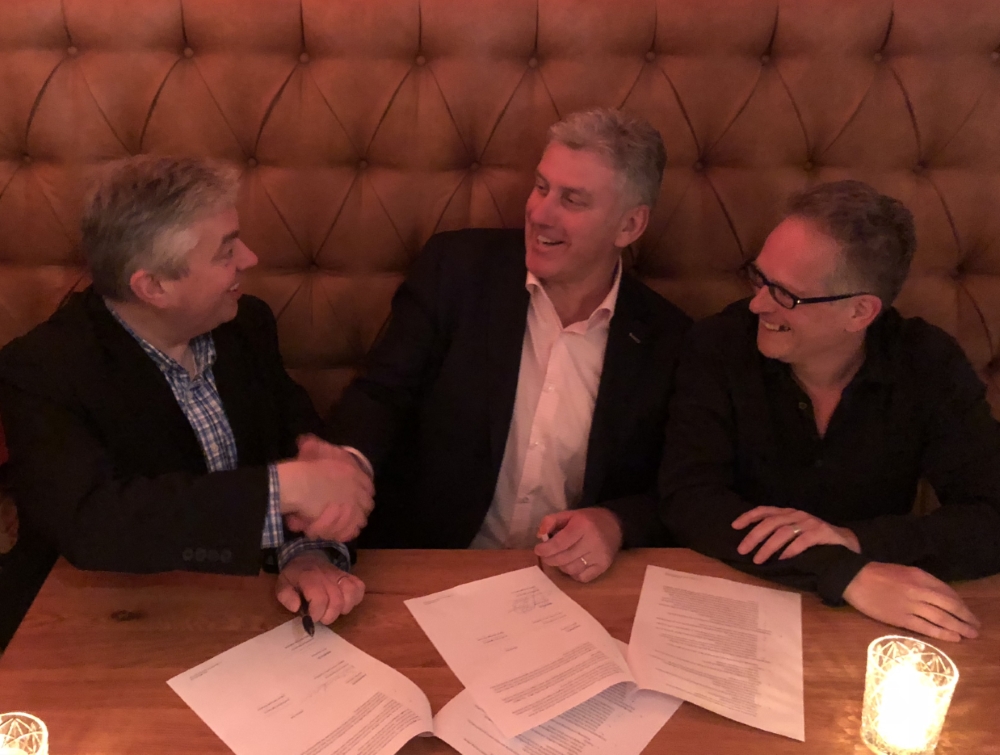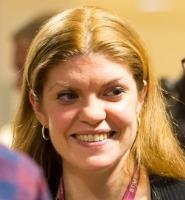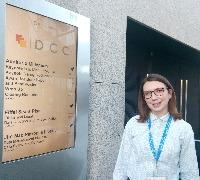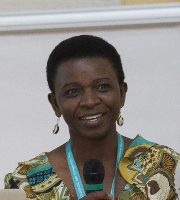DPC
Software Preservation Webinar EPISODE 1: Software Preservation Overview
The Software Preservation Webinar Series provides a survey of software preservation contexts. Each episode explores a different software preservation context by providing an overview, discussion with guest speakers (specialists in digital preservation, software studies, scholarly communication, open source software and more) and open discussion with attendees.
The webinar series is jointly hosted by the Digital Preservation Coalition and the Software Preservation Network.
EPISODE 1: Software Preservation Overview
This episode provides an overview of software preservation including past and current programmatic and project-based efforts to address key facets of software preservation such as metadata & standards, law & policy, technological infrastructure, research and training & education. Presenters provide additional detail about the subsequent episodes in the series, and solicit questions/topics from attendees that will inform open discussion with guests.
Sharing experiences and perspectives is critical to understanding the hurdles in software preservation, to imagining future use of software-dependent data, and to forming a mutual understanding of where collective action is necessary to facilitate those future uses so we hope you can join the discussion.
Speakers:
- Jessica Meyerson, Software Preservation Network
- Paul Wheatley, Digital Preservation Coalition
- Introduced and moderated by William Kilbride, Digital Preservation Coalition
Watch the recording
(Runtime 48mins)
Read the Chat from the webinar: Episode 1
Supplementary Resources
Websites & Blogs
bwFLA – Emulation as a service website http://eaas.uni-freiburg.de/
CAMiLEON Project Website, https://web.archive.org/web/20060801000000*/http:/www.si.umich.edu/CAMILEON/
JISC Funded Workshops on Software Preservation: Raising awareness of preservation issues within software development https://softwarepreservation.jiscinvolve.org/wp/
Mapstalgia Blog, Josh Millard http://mapstalgia.tumblr.com/
Variable Media Initiative, Guggenheim website https://www.guggenheim.org/conservation/the-variable-media-initiative
Software Heritage website https://www.softwareheritage.org/
Software Preservation Network Series, BLOGGERS! The Blog of SAA’s Electronic Record Section
- Overview
- Legal and Policy Aspects of Software Preservation
- Collecting, Processing, and Providing Access to Software
- Prospects in Software Preservation Partnerships
- Community Roadmapping for Moving Forward
Articles & Reports
Cochrane, E. Rendering Matters. Archives New Zealand.
https://web.archive.org/web/20130218111126/http:/archives.govt.nz/rendering-matters-report-results-research-digital-object-rendering
Newman,J.(2011). (Not) Playing Games: Player-Produced Walkthroughs as Archival Documents of Digital Gameplay. International Journal of Digital Curation. 2011; Issue 2, Volume 6. https://doi.org/10.2218/ijdc.v6i2.206
Swade,D.(1993). The Problems of Software Conservation. (Computer RESURRECTION, The Bulletin of the Computer Conservation Society [Autumn 1993].1993;Issue 7) http://www.computerconservationsociety.org/resurrection/res07.htm#f
Software Heritage – Why and How to Preserve Source Code https://hal.archives-ouvertes.fr/hal-01590958/document
SPN Curation Readiness Working Group Reports
- Report 1: Exploring Curation-ready Software Use Cases
- Report 2: Improving Curation-readiness https://osf.io/crfyv/
“The Emularity” blog post, Jason Scott, Internet Archive, Textfiles.com http://ascii.textfiles.com/archives/4546
2017 Report on the First IEEE Workshop on the Future of Research Curation and Research Reproducibility
https://www.ieee.org/publications_standards/publications/ieee_workshops/ieee_reproducibility_workshop_report_final.pdf
The Software Preservation Network (SPN): A Community Effort to Ensure Long Term Access to Digital Cultural Heritage, D-Lib Magazine, May/June 2017, Volume 23, Number ⅚ http://www.dlib.org/dlib/may17/meyerson/05meyerson.html
Ongoing Discussion
Add your thoughts and comments below...
The Digital Preservation Coalition and Dutch Digital Heritage Network sign new Friendship Agreement
Added on 24 April 2018
The Digital Preservation Coalition (DPC) and the Dutch Digital Heritage Network (DHN) have signed a new friendship agreement today to confirm their commitment to international exchange and cooperation in the field of digital preservation.

The DPC's William Kilbride shakes hands with Wim Westland, Chair of the Domain Group Sustainable Digital Heritage. Marcel Ras, Domain Manager for Sustainable Digital Heritage and former Program Manager for the NCDD also signed the Friendship Agreement.
With a long-standing alliance between DPC and the Netherlands Coalition for Digital Preservation (NCDD) already in place, this new agreement recognizes the joining of forces between NCDD and DHN which took place on 1st March 2018 and acknowledges a desire to continue working collaboratively. With the goal of establishing a mutually beneficial relationship for the members of each organization, the DPC and DHN will continue to participate in the achievement of shared objectives to increase awareness of the social value of cultural heritage offered by digital technology and secure our digital legacy.
What's Going On...
As anyone who has attended one of our ‘Getting Started with Digital Preservation’ workshops will know, I love maturity modelling (and talking at length about why I love maturity modelling…..) Whether you're looking for a light weight tech-focused approach like the NDSA Levels through to something more indepth like the Digital Preservation Capability Maturity Model, there's something out there for you. Why am I such an advocate for this process, you ask? It’s because I believe that if you’re serious about achieving success in any endeavour, and especially in the case of digital preservation, that it is essential to stop every now and then to take a breath and have a critical look at how you’re doing. Maturity modelling is an excellent tool for this, allowing you to benchmark your progress and shape where you want to go next. The information you generate from this process is not only useful for review and planning, but also for activities like advocacy and building a business case.
User access to born-digital archives: first steps for Wellcome Collection
The post was written by Victoria Sloyan, Archivist at the Wellcome Collection
Last November, the Collections Information Team at Wellcome Collection and Dr James Baker from the University of Sussex organised a workshop to bring together researchers and archival professionals to explore methods for providing access to born-digital archives.
Wellcome has been acquiring born-digital records for over a decade. Initially, the focus was on encouraging donations of digital media and getting hold of the material. Once records started to arrive we turned out attention to making sure they were kept safe and adequately preserved. We then began cataloguing in earnest, leading to all kinds of questions being considered about arrangement and description: is there an original order? How will researchers expect to navigate and use born-digital records? To what extent is the metadata embedded in digital files sufficient for research use? Many of our decisions were based on best guesses, recognising that we didn’t fully understand how the catalogue records or the born-digital records themselves would be interrogated and used by researchers.
Notes from IDCC 2018 - Day Two
Day two of IDCC18 explored not only how we can better support data management, but also what we can do with data to meet the aims of our organisations, and finally how we can work together to create more inclusive communities that support innovative solutions. Inclusivity was also the theme of the closing remarks, which revealed that the conference organisers had taken steps to encourage a more even gender balance in the contributing voices. The overall atmosphere of the second day was one of being invited to consider new possibilities, adopt new approaches and contribute to the conversation.
Notes from IDCC 2018 - Day One
The 13th IDCC took place in Barcelona in February this year and with the help of a scholarship from the DPC, I was able to attend for the first time. The conference theme was ‘Beyond FAIR’ (findable, accessible, interoperable and reusable) data, and these principles were at the heart of many of the talks. Questions surfaced about the extent to which it is possible to make data FAIR, the challenges involved and what needs to be considered outside these principles. As a new professional, it was interesting to hear about data curation in a range of contexts from those actively engaged in digital practice. The focus on sharing practical lessons meant being able to see examples from across the data curation community of the principles of FAIR data being applied. The enthusiasm of the speakers to talk about the work they are involved in, the developments they’ve made as well as the setbacks they’ve experienced in the pursuit of making data FAIR was not only useful but inspiring.
Qatar National Library joins the Digital Preservation Coalition
Added on 10 April 2018
Qatar National Library (QNL) has joined the Digital Preservation Coalition, becoming the DPC’s newest Associate member.
Among its mandates, QNL has a remit to collect, preserve and provide access to heritage content and materials representative of Qatar and the wider Arab region. Collections are made available through the Library itself, as well as through its research library function to support education and research at all levels, and through its public library function which serves the metropolitan area. With each of these functions increasingly being fulfilled digitally, addressing issues of digital preservation has become a cornerstone of QNL’s operations.
I Second That Emotion....
In my previous blog post ‘Let’s Get Together and Feel Alright….’ (can we see a theme with the titles?) I touched on some of the reasons why I think it’s important to not only accept diversity and inclusion within the Digital Preservation Community but to actively work to encourage it. Similar themes are picked up and expanded upon in Somaya Langley’s important new post on the DPOC Project Blog ‘The Ethics of Working in Digital Preservation’.
Somaya talks about her own experiences, both good and bad, and how they have led her to the conclusion that only by working together as a respectful, welcoming and inclusive community can we achieve real progress towards our digital preservation goals. No one can do this in isolation and we must invite all kinds of different people to the table.
I could not agree more whole-heartedly, especially with Somaya’s conclusion that we must be proactive and clear about who we want to be as a community. At the end of my blog post I mentioned that at the DPC we were embarking on a piece of work to look at best practice for inclusion, diversity, accessibility and codes of conduct. I’m pleased say this work has been making good progress and a draft proposal for a ‘Digital Preservation Community Charter’ is going out to some key stakeholders for their input and feedback. We hope to develop this further with the wider digital preservation community over the coming weeks.
Keep an eye out for more on that in the near future, but in the meantime make sure to check out
Digital preservation at the UNMICT: the year in retrospect...
The United Nations International Residual Mechanism for Criminal Tribunals (Mechanism) was established in December 2010 by the United Nations Security Council as the successor of the International Criminal Tribunal for Rwanda (ICTR) and the International Criminal Tribunal for the former Yugoslavia (ICTY). It began operations in Arusha in 2012 and in The Hague in 2013. According to its Statute, the Mechanism is mandated to, among other things, preserve and provide access to the archives of the ICTR, the ICTY, and the Mechanism itself. The Mechanism took custody of the ICTR and the ICTY archives by the time of the closure of these Tribunals in 2015 and 2017, respectively.
The volume and complexity of the material presents a variety of technical challenges, particularly with regard to the digital records. The ultimate volume of the digital archives will be approximately three petabytes, composed of born-digital and digitized documents, audio and video recordings, photographs, databases and websites - all of this in a variety of formats. To date, more than 50 file formats have been identified.
The Digital Preservation Coalition welcomes the Internet Archive as its 80th Member
Added on 29 March 2018
The Internet Archive (IA) has joined the Digital Preservation Coalition, becoming its 80th Member.
As the world's largest and oldest web archive, and a large-scale digital library committed to ‘universal access to all knowledge,’ the Internet Archive brings significant expertise to acquiring, preserving, and providing access to digital materials.
Based in San Francisco USA, the Internet Archive is the original developer of a suite of web archiving, digitization, and access technologies that remain industry standards and works with national and international libraries, archives, governments, non-profit technology organizations, and community initiatives, for almost two decades to provide digital library, preservation, and archiving services.


































































































































